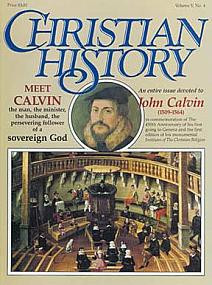Calvinists rejected Arminianism at the Synod of Dort
DOCTRINES of God’s sovereignty and man’s free will, of election and human choice are among the most difficult and contested in Christianity. Calvinists in the Netherlands convened the Synod of Dort on this day, 13 November 1618, to deal with these issues.
Augustine, who “discovered” (his word) his doctrine of election while battling the Pelagian heresy, was the first to speak of predestination in modern terms. Catholic bishops challenged Augustine to show that his teaching was traceable to the earliest church fathers on the grounds that what is novel in theology is heretical. Augustine pointed to his contemporary Ambrose and the third-century theologian Cyprian.
By Calvin’s day, Augustine’s system had been around for a millennium. Calvin created a powerful body of doctrine from it. Dutch proponents interpreted it to teach that God chose some people to be damned before he created them, Christ's death was not for all people, God exercised sovereignty so fully that no person had any choice in his or her own salvation, and regeneration came before repentance.
Jacob Arminius was professor of theology at Leyden. He had sworn to teach only what conformed to the confessions of faith of the Calvinist state church of the Netherlands. While technically adhering to his oath, he laid contradictory verses beside the Calvinist proof texts, throwing the latter into doubt. In private he explained his opinions to inquiring students. Arminius too had church fathers on his side, pointing to passages from the writings of Justin Martyr (died ca. 165) and the writings of Clement of Alexandria (flourished 200). Arminius tried to have the confessions of the state church amended. However, for the sake of peace he publicly downplayed his differences with Calvinism.
Many Dutch pastors accepted Arminius’ views. After his death, they issued a Remonstrance, challenging the famous “five points” of Calvinism (total depravity, unconditional election, limited atonement, irresistible grace, and perseverance of the saints). To make the conflict worse, both sides became embroiled in politics. The Arminians (Remonstrants) advocated states’ rights and peace with Spain. The Calvinists sided with Maurice, who was attempting to impose a more centralized government and who advocated war with Spain.
The government called a synod (church council) to condemn the Remonstrants. Controlled by Calvinists, the synod invited Calvinists from neighboring countries to attend, and met alone until the sixth of December. Then they called Remonstrants to state and defend their positions. Those who were summoned to the synod found their movements restricted. They were forbidden to have their strongest speakers represent them. Afterward, two hundred Remonstrants were expelled from their pulpits. The pro-Remonstrant statesman John Oldenbarneveld was executed. The synod issued a point by point response to the Remonstrance—the principles known as TULIP (the five points above).
The Dutch squabble influenced the church world-wide. Wesleyans, Methodists, Nazarenes, Free Will Baptists, many Anglicans, and similar groups adopted Arminian theology. Reformed churches, Presbyterians, and some Baptists adhered to variations of Calvinism. Thousands of books have debated the issues. In 1630 the Dutch allowed exiled Arminians to return home and to preach in private buildings.
—Dan Graves
------------------
For a general overview of the church ages, watch History of Christianity, presented by Dr. Timothy George.
For another view of the synod and its results, read "T.U.L.I.P." in Christian History #12, John Calvin






